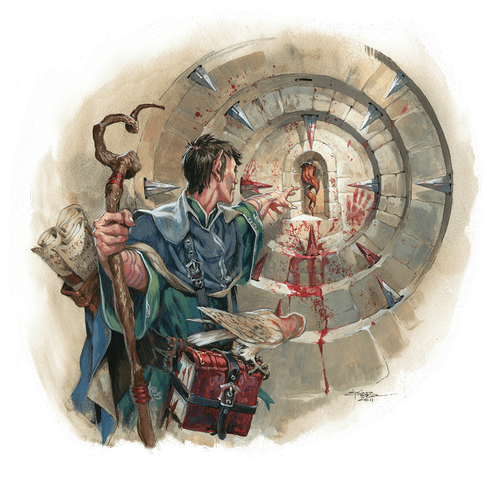D&D 5e: Breaking Passive Perception With Observant

D&D 5e: Breaking Passive Perception With Observant
SOURCE: Player’s Handbook
Observant is Weird, But Fine
Observant is a strange and occasionally controversial feat that relies upon some of D&D 5e’s stranger and more poorly understood rules regarding passive scores. It’s a fine middle of the road feat power-wise with one bizarre use: bumping your passive perception up to a ludicrous degree.
Benefit #1 –
+1 to wisdom or intelligence
Arguably the best part of the feat, this lets you round out an odd wisdom or intelligence score, letting your intelligence and wisdom based spellcasters or in rare cases int/wis attackers increase their spellcasting power. Increasing wisdom also boosts your perception and wisdom saves by +1, assuming it’s odd. Plan ahead during character creation to take advantage of this.
Benefit #2 –
You can read lips now.
Not usually a big deal, but it can be useful for understanding allies while deafened or something, or for spying on enemies through a magical or nonmagical means of surveillance that lets you see enemies but not hear them.
Benefit #3 –
+5 to passive perception and passive investigation
The most famous (or infamous) part of this feat. Adding +5, combined with a +1 from rounding up an odd wisdom score, can lead to insanely high passive perception scores. Passive investigation is rarely used, but you get a similar bonus to that score.

How Observant Really Works
Understanding How Passive Checks Function
Passive checks are one of the obscure and frequently misunderstood rules in D&D 5e; unlike most rules, you can’t get consistently accurate explanations of them online. You must refer to the D&D 5e Player’s Handbook for the rules.
In short, passive checks are a form of check used in two situations: when you’re setting DCs for creatures to attempt to hide from other creatures, and then basically whenever the DM wants to use passive checks; the player’s handbook recommends using passive checks to represent the result of something done repeatedly or something the DM wants to handle in secret without rolling.
A passive check is like a normal ability check, but instead of rolling dice, the result is equal to 10 + any modifiers that apply, then +5 is added if the check has advantage, and a -5 is added if the check has disadvantage. Then the result is used for whatever it’s needed for, whether it’s the DC for a stealth check or someone’s repeated attempts at investigating. Any check can be passive, but perception is by far the most common due to its use in stealth and its explicit mention in monster stat blocks. Assassin Rogues in particular benefit the most from surprise.
Misconceptions about passive perception are common, so clarify things with your DM before taking Observant.
How to Break Passive Perception With Observant
You will want as high of a wisdom score as possible, and preferably have your wisdom score at an odd number before taking the feat so that the ASI from Observant can bump up your wisdom modifier. Next, you want proficiency and possibly expertise in perception, and finally, you want advantage on perception checks. With a proficiency bonus of +6, expertise, advantage, Observant, and a wisdom of 20, your passive perception score will be 10+12+5+5 for a whopping 32.
This will make it impossible for creatures to surprise you in combat unless they’re both stealthier than anything in the Monster Manual and roll extremely high, and trivialize any checks your DM uses passive perception for.
Ideal Builds Using Observant
Top Classes
Wizard – Is your intelligence score odd? Not interested in Fey Touched, Shadow Touched, Telekinetic, or Telepathic, possibly on account of being a higher level where these feats are less useful? Take Observant and increase your intelligence, then with Investigation and Perception proficiency, you can become one of the world’s greatest detectives.
Rogue – Rogues have built-in expertise. Expertise makes Observant even more ridiculous. Excellent pick, especially if your DM has decided that passive perception can be used to locate traps, which are often what rogues are called upon to deal with.
Cleric or Druid – Clerics and Druids are the two classes that usually have the highest wisdom scores out of any characters, spellcasters, or otherwise. Use Observant’s ASI to boost an odd wisdom, take proficiency in perception, and then just keep boosting that wisdom. Get expertise somehow and that 32 passive perception will be more and more likely. A Twilight Cleric also has access to the largest darkvision range in the game, letting them make the most of their perception at night.
Multiclassing Considerations
A one level dip in Rogue for their expertise feature can increase your passive perception even more, but aside from that, you might be better off not multiclassing.
Race or Subrace Choices
Even a 32 passive perception is useless if you can’t even see to begin with, so any of the many races with darkvision will be useful. Remember that darkvision isn’t perfect, and you have disadvantage on perception checks (and -5 to passive perception) in dim light, but that’s better than nothing.
Combos, Tactics, and Synergies
Complementary Feats
Skill Expert (Perception) will let you get expertise on any character. Put that expertise into perception, and the ASI wherever you like (even to a non-wisdom stat like Strength or Constitution), and then boom, easy ridiculous perception. Best taken at higher levels though, when your proficiency bonus is bigger.
Spells that Synergize
Enhance Ability will give you advantage on all wisdom checks, including perception, for another +5. If you want to turn the tables on stealthy monsters, negate their own surprise with your Observant feat and then use Pass Without Trace to surprise them instead.
How to Use Observant at the Actual Table
Always, always keep your dungeon master in mind while using Observant, and make sure they know you have a passive perception that’s huge: because so much of passive checks rely on the DM, you need to communicate with them thoughtfully. Don’t antagonize your DM by gloating about how you’ll trivialize all their perception checks because they’ll be inclined to punish or at least mitigate your hubris somehow.
Final Thoughts on Observant
Observant is a perfectly fine, middle of the road option for any character, and it’s especially good on intelligence and wisdom based characters. Remember that you shouldn’t dump the power of your character just to get a bigger bonus to passive perception though; if your fighter has a choice between Sharpshooter plus Crossbow Expert or Observant plus Skill Expert, go Sharpshooter plus Crossbow Expert unless you don’t need more damage for some reason.








